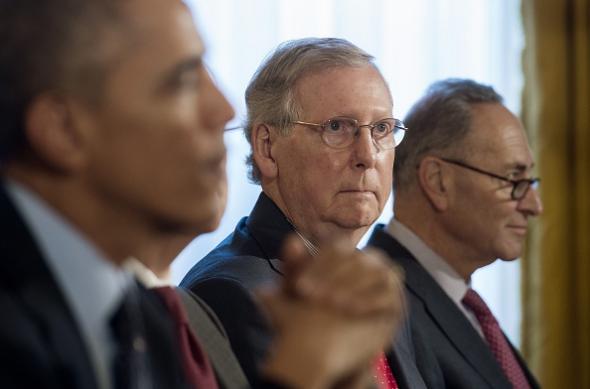In the days since Antonin Scalia’s death, majority leader Mitch McConnell and several other Republican senators have said that the president who’s elected in November—i.e. not Barack Obama—should appoint Scalia’s replacement on the Supreme Court. Though the GOPers have framed this position as deference to the will of the national electorate, the democracy rhetoric seems to many like cover for the purely partisan hope that the next president will be a Republican. What’s more, some observers have suggested, Democrats defending Obama’s right to make an appointment have no higher principle in mind than their own partisan interest—and might be saying the same things as McConnell et. al if the shoe were on the other foot.
Is that true? If the dynamics of the situation were reversed, would Democrats be going so far as to say—as McConnell and other Republicans have—that the Senate shouldn’t even consider the president’s choice for approval? Let’s consider both sides of the argument.
Reasons to believe Democrats would be doing the same thing as the Republicans are doing if the shoe were on the other foot:
Chuck Schumer said in 2007 that Democrats should not confirm any George W. Bush SCOTUS appointments who didn’t prove that “they are in the mainstream.” Schumer has, in recent days, pointed out that his 2007 remarks were ostensibly about ideologically extreme nominees, not all nominees, and that he never said those nominees shouldn’t come up for a vote at all. (On the other hand, one of the justices who Schumer cited as a Bush extremist was John Roberts, who has turned out to be relatively moderate. Read about the full context of Schumer’s remarks in this informative Washington Post piece.)
Barack Obama, John Kerry, and a number of other Democratic senators filibustered Samuel Alito in 2006. Obama was among 23 Democratic senators who joined Kerry in voting to filibuster Alito—an effort that Kerry led remotely because he, in classic cartoon-patrician John Kerry fashion, was in Switzerland at the time. This group of Dems’ stated objection, though, was Alito’s extremism, not the mere fact of his nomination.
Democrats are politicians and politicians all do things they claim they would never do. Kind of a vague point, I know. But it’s true!
Reasons to believe Democrats wouldn’t be doing the same thing as the Republicans are doing if the shoe were on the other foot:
Not even all Republicans currently agree with the position that McConnell and his backers have taken. Judiciary Committee chair Chuck Grassley and North Carolina senator Thom Tillis are among the GOP figures who have said that Republicans should at least consider an Obama nominee.
Democratic senators have less incentive to take a hard line because they’re less likely than Republican senators to be challenged by a more ideologically extreme primary opponent. Five of the 10 Republican senators running for reelection in 2014 were opposed by in-party challengers who got 35 percent or more of the primary vote. None of the 15 Democrats who ran for reelection faced challengers who got even close to 35 percent. Republicans who compromise with a Democratic president take considerable heat from within their party. That hasn’t been true of Democrats.
Related: Democrats tend to move toward the center when they think the prevailing political winds are blowing against them. From the Iraq War to the decision not to include a “public option” in the Affordable Care Act, Democrats have generally been less willing than Republicans in recent years to take stubborn and/or broadly unpopular positions. As it happens, the GOP’s singular extremism is a phenomenon that’s been well-documented by wonk king Norm Ornstein, who told Slate’s Isaac Chotiner this week that the Republicans’ treatment of Obama judicial nominees has been more obstructive than the Democrats’ treatment of George W. Bush nominees was.
Democrats have never threatened to ruin the economy to make a point. Perhaps the closest legislative move that can match “leaving a vacancy on the Supeme Court for a whole damn year” in terms of partisan irresponsibility is refusing to raise the debt ceiling, an action which is occasionally necessary to prevent economic catastrophe. Democrats have voted en masse against debt ceiling raises, but never when they held the chamber that was voting—i.e. they did the responsible thing when they actually held power. It’s a hypocritical and intellectually inconsistent approach, definitely, but also one that has the advantage of not ruining the economy. Republicans, by contrast, threatened seriously to vote down ceiling raises (and had the power to follow through on their threats) in both 2011 and 2013.*
No one has rejected consideration of a Supreme Court nominee like this before. The only individual nominated for SCOTUS in an election year since 1940 was Abe Fortas, who was nominated in June 1968 and who withdrew his nomination after being filibustered—after hearings—by Republicans and southern Democrats. Since then, majority-Democratic Senates confirmed John Paul Stevens, William Rehnquist, Lewis Powell, and Anthony Kennedy less than a year before an election after nominations by Republican presidents.**
Of course, this question is ultimately hypothetical; you can’t prove what would happen in our alternate shoe-on-other-foot universe either way. But as you can probably tell, my subjective judgment, given the above, is that even if they wanted to leave a vacancy on the Court for a whole year under a Republican president, Democrats would eventually fold and at least consider a conservative nominee.
*Correction, Feb. 18, 2016: This sentence originally misstated that Republicans controlled the Senate in 2011 and 2013.
**Correction, Feb. 23, 2016: This sentence originally misstated that Stevens et. al were all nominated less than a year before a presidential election, but that’s only true of Kennedy; in fact what the four justices have in common is that they were confirmed less than a year before an election.
